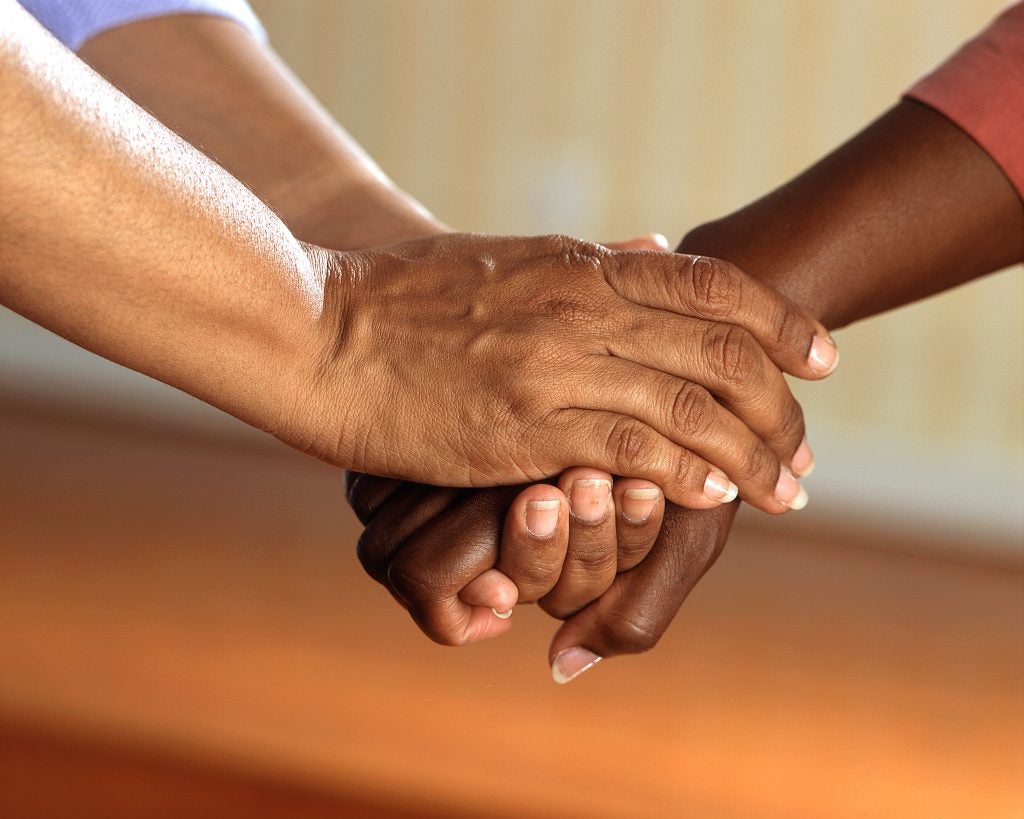Disclaimer: We acknowledge that there are many different words that individuals use to describe themselves after experiencing sexual assault, and in this article, we only use the term “survivor” for the sake of consistency. We acknowledge that there are many different ways of processing sexual violence, and we believe each individual should be able to choose the language that they are most comfortable with.

Table of Contents
Listen and Comfort Them
The most important thing you can do for a survivor who has shared their experience with you is listen. Your friend or loved one has chosen to share something deeply personal with you, and it is likely going to be very hard for them to fully explain the story. Offer your open ears, and give them your full, undivided attention. Do not jump to conclusions or make judgments. Let your friend decide what he or she would like to tell you, and do not push them to give more information than they want to. Be patient, understanding, and know that your friend or loved one may need weeks, months, or even years before they can fully talk about what happened. Try your best to be easily accessible to the person in the weeks and months after the assault, as they may need to confide in you on a regular basis.
Don’t Make Assumptions or Assign Blame
First, remember that rape and sexual assault can happen to anyone, regardless of their sex or gender identity. Because rape can be and often is committed by a friend or acquaintance of the survivor, you may have met the suspect or even consider them a friend. Even so, do not draw conclusions on who was responsible for the sexual assault. It is crucial that you remain unbiased; do not blame the survivor. No one ever asks to be raped or sexually assaulted. A common misconception is that women and men are “asking for it” because of the way they dress or act, the amount of alcohol or drugs they intake, or the situations they put themselves in. Take your friend or loved one’s word as truth, and respect his or her choice to tell you about the experience. Avoid questions such as:
- “Were you flirting with him/her?”
- “Were you drunk?”
- “What did you do to lead them on?”
These questions, regardless of tone or intent, may push the survivor towards self-blame. Second, do not be surprised if the survivor starts to make self-blaming statements of their own. It is very common for survivors of trauma to blame themselves. If this occurs, you may want to gently remind the survivor that they are not at fault, but do not push them to change their mind if they resist. Healing is a long and complex process, and every survivor experiences at their own rate.
Help to Seek Further Resources

Encourage your friend to make her or his own decisions regarding the assault. If the survivor knows the assaulter and wishes to press charges, help them do so. If they decide not to tell anyone else, respect that decision. Look for resources or local rape crisis centers in the nearby area, and inform your friend about their options. If they want to talk to someone else, consider referring them to a sexual assault hotline, a rape crisis center, or counseling. If the survivor comes to you seven days or less after the sexual assault occurred, and she or he would like to press charges, suggest that the two of you go to the nearest ER. ER staff will perform a forensic medical exam, also known as a “rape kit,” which will collect possible evidence against the perpetrator.1 It is recommended that the rape survivor not use the restroom, shower, eat, change clothes, or brush their teeth after the assault in order to preserve possible evidence.1 If the sexual assault included genital rape, a doctor may also test for sexually transmitted infections or prescribe emergency contraception if there is a risk of pregnancy.
Keep It Confidential
Keep your friend or loved one’s experience private. If she or he seems depressed, anxious, or exhibits unusual behavior, know that these are all emotional side effects that can be expected of survivors of sexual assault. Suggest that they see a counselor, therapist, or other support figure to further explore the experience. If the person stops interacting with others, avoids communication, or expresses suicidal thoughts, seek advice from a local rape crisis center or health clinic. They may tell you to inform the survivor’s family, so that she or he can get the help they require.
Take Care of Yourself

Last but not least, take care of yourself as well. Being a friend or confidant to a survivor of sexual assault can be a heavy burden in itself. Your friend chose to tell you for a reason—they trust you. If you feel overwhelmed or stressed being the sole keeper of your friend’s secret, consider seeing a counselor or other support figure. They may help you better understand how you can support your friend or loved one through this trying time.
If you would like to talk to someone immediately, call this number: 1.800.656.HOPE (National Sexual Assault Hotline)
References
1. “Help A Friend | Rape Treatment Center.” Help A Friend | Rape Treatment Center. N.p., n.d. Web. 24 Jan. 2015.
2. Trotta, Sarah O. “How To Help A Friend Who Has Been Sexually Assaulted.” Everyday Feminism. N.p., 21 Jan. 2013. Web. 24 Jan. 2015.
Last updated 5 February 2015.
